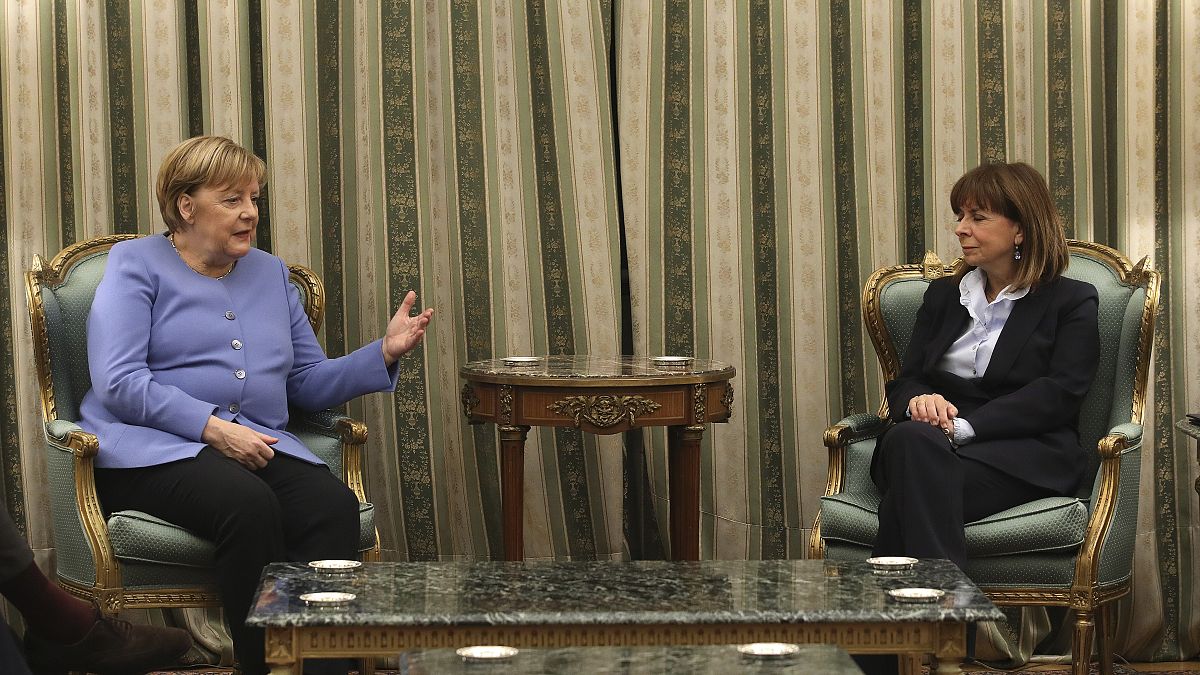Relations between Greece and Germany were often thorny during Merkel's tenure due to the financial crisis.
Germany's outgoing Chancellor Angela Merkel has arrived in Greece on her last official trip to the country.
Merkel landed in Athens on Thursday evening, ahead of official meetings with Prime Minister Kyriakos Mitsotakis and President Katerina Sakellaropoulou.
The financial crisis in Greece marked much of Merkel's 16-year tenure as Chancellor, as well as Germany's relationship with Europe.
On Friday, President Sakellaropoulou told Merkel that "there were times of difficulty and tension".
"The financial crisis that many countries of Europe faced put mainly Greece, which was called on to pay a heavy price, in a difficult position," she said.
"It was an unprecedented situation ... and Greece felt, we justifiably often felt alone."
Germany was the largest single contributor to three successive international bailout packages Greece received from 2010 to 2018.
Tensions between the two countries were high during the decade-long crisis, which nearly saw Greece crashing out of the euro.
Dire finances locked Greece out of bond markets, meaning it could not raise funds on its own, and wiping out a quarter of the country's economy.
But the rescue loans arrived, placing Greece's economy under strict supervision by the eurozone, the European Central Bank, and the International Monetary Fund.
New reforms -- including repeated tax hikes and cuts in pensions, salaries, and public spending -- are deeply resented in Greece.
Many Greek citizens blamed Merkel -- and her finance minister Wolfgang Schäuble -- for plummeting living standards, soaring unemployment, and economic depression.
But as the country's financial situation gradually improved, so too did relations with Germany.
“I believe that the time that has passed and the experiences we lived through during this period contributed to mutual understanding and the drawing of useful conclusions for the present and the future,” Sakellaropoulou said.
“It is important that Europe maintained its cohesion, and this was shown in its handling of the pandemic and in the Recovery Fund.”
Merkel added on Friday that "dialogue was always the key to searching for and finding a solution."
The German chancellor last visited Athens in January 2019 to meet former prime minister Alexis Tsipras.
During that trip, Merkel praised Greece's improvement in its finances and Tsipras said that "the difficulties now lie behind us".
The left-wing politician had once famously declared "Go Back, Mrs. Merkel" during a campaign speech.
Talks in 2021 are likely to focus more on geopolitics, with Greece and neighbouring Turkey facing off over territorial disputes and drilling rights in the eastern Mediterranean.
Chancellery spokesperson Steffen Seibert said Germany was "convinced" that good relations between Greece and Turkey were "important and beneficial" for all of Europe.
The visit also takes place on a Greek national holiday marking the day in 1940 when the country rejected fascism and Nazism in the Second World War
The decision led to Greece entering World War II, fighting a far stronger adversary and eventually suffering a brutal occupation by Nazi Germany.
"It is a highly symbolic visit because it will allow us to take stock of Greek-German relations," a Greek government source commented.
